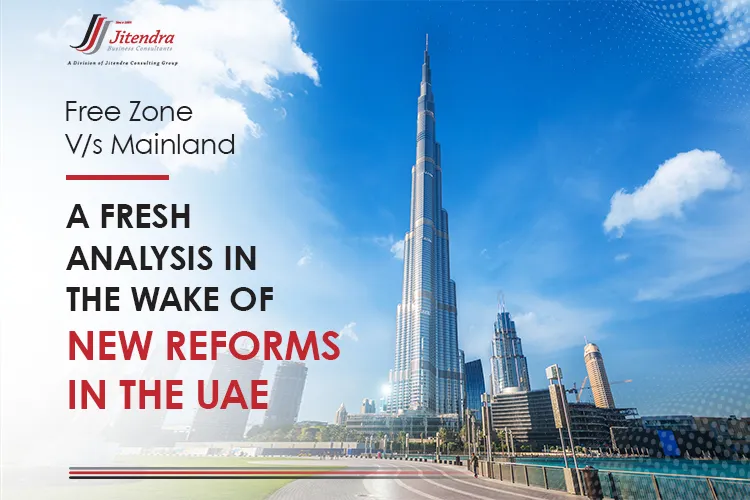
When it comes to the process of business setup in Dubai, foreign entrepreneurs need to navigate certain challenges and make some strategic decisions. Accurately identifying the type of company to be incorporated is the most important of those strategic decisions. To be precise, you need to make the right decision when it comes to choosing between a mainland company and a free zone business.
It’s a tough decision to make as it depends upon your specific business requirements. You need to finalise the right form of company incorporation in Dubai after carefully considering the core differences between the two. The assistance of business setup consultants in Dubai may come in handy for you to make the right decision. Meanwhile, the following article may help you to differentiate between company formation in Dubai’s mainland V/s free zones.
1. Control over Ownership
Ownership has been the top factor that distinguished free zones from mainland companies. Up until June 2021, regulations of business setup in Dubai mainland didn’t allow foreign investors to have complete ownership of their companies. Mainland companies were required to grant at least 51% of the shares to a UAE national partner who will act as the company’s local sponsor.
However, after June 2021, around 1000 activities were allowed to have full foreign ownership without the requirement of a local sponsor. These business activities mainly cover commercial licenses including the General Trading License. However, strategic activities covering seven sectors are excluded from the purview of 100% ownership reform. On the other hand, free zones in the UAE always allow foreign investors to have complete control over their businesses.
2. Restrictions on Trade
The scope of business is a major difference based on which you have to choose between the mainland and the free zone. By obtaining a mainland company license, you can trade anywhere in the UAE as well as overseas without any restrictions. If you want to cater to a larger customer base, it is better to open a mainland company in Dubai.
Typically, the companies operating in a free zone are not allowed trade on the mainland. They can either trade internationally or within the free zone premises. However, free zone companies can trade on the mainland if they partner with a local distributor. A dual license offered by free zones also allows you to trade in the mainland while operating from your office in the free zone.
3. Value Added Tax on Businesses
A free zone by its definition is a tax-free economic zone. Companies licensed by the free zones are exempted from all taxes, (depending on the free zone) for up to 50 years. The UAE has listed 25 free zones as Designated Zones for Value Added Tax (VAT). Designated zones will be treated as outside the UAE and no VAT will be charged on the transactions for import of goods in these Designated Zones, supply of goods within the Designated Zone or between Designated Zones, with some exceptions noted. However, mainland companies have to follow the 5% VAT regulations.
4. Corporate Tax on Profits
From June 2023, companies operating in the UAE will be subject to corporate tax regulations. Mainland businesses with profits exceeding AED 375,000 will be subject to 9% corporate tax soon. However, businesses operating within the UAE free zones will be subject to 0% corporate tax provided they maintain adequate substance and meet relevant regulatory requirements. The 0% UAE corporate tax applies to both incomes earned from outside the state as well as income earned from other free zone businesses. However, it is important to note that the mainland branch of a free zone company will not be able to enjoy the 0% corporate tax rate on its free zone income.
5. Scope of Business Activities
Mainland companies get more number of business activities to choose from. The process of business setup in Dubai is being regulated by the Department of Economic Development (DED), which offers more than 2000 activities to choose from. On the other hand, free zones provide a limited number of activities with each free zone catering to a specific business sector. For instance, Dubai Media City mainly offers media activities and Dubai Silicon Oasis (DSO) provides tech-related activities.
6. Ease of Company Formation in Dubai
It is easy to set up a business in Dubai free zones as each free zone has its own set of regulations. The rules are flexible and respective free zone authorities provide all services under a single roof. You don’t need to run around government departments to obtain a trade license in Dubai free zones.
The process of business setup in Dubai mainland strictly follows the Commercial Companies Law. You need to obtain external approvals from various government departments and ministries even after getting the DED initial approval. Certain activities are classified as special activities (accounting, law, consultancies etc.), which require mandatory approval from the concerned ministries. However, business setup consultants in Dubai can make the approval process easier for you with bespoke assistance.
Consult with the Best Business Setup Consultants in Dubai, UAE
The process of business setup in Dubai requires you to make the strategic decision of choosing between the mainland and free zone options. Entrepreneurs may find it tough to make the decision but the best business setup consultants in the UAE such as Jitendra Business Consultants (JBC) can help you to navigate this roadblock.
JBC can guide you on the pros and cons of both forms of company formation. We can advise you on the activities, licenses, relevant approvals etc. JBC’s consultants can assist you with key requirements such as visa processing and renewal, bank account opening, Ultimate Beneficial Ownership (UBO) rules, Economic Substance Regulations (ESR), and laws related to Anti-money Laundering (AML), UAE corporate tax, VAT etc.

